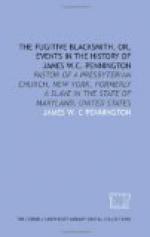My master had a deeply pious and exemplary slave, an elderly man, who one day had a misunderstanding with the overseer, when the latter attempted to flog him. He fled to the woods; it was noon; at evening he came home orderly. The next morning, my master, taking one of his sons with him, a rope and cowhide in his hand, led the poor old man away into the stable; tied him up, and ordered the son to lay on thirty-nine lashes, which he did, making the keen end of the cowhide lap around and strike him in the tenderest part of his side, till the blood sped out, as if a lance had been used.
While my master’s son was thus engaged, the sufferer’s little daughter, a child six years of age, stood at the door, weeping in agony for the fate of her father. I heard the old man articulating in a low tone of voice; I listened at the intervals between the stripes, and lo! he was praying!
When the last lash was laid on, he was let down; and leaving him to put on his clothes, they passed out of the door, and drove the man’s weeping child away! I was mending a hinge to one of the barn doors; I saw and heard what I have stated. Six months after, this same man’s eldest daughter, a girl fifteen years old, was sold to slave-traders, where he never saw her more.
This poor slave and his wife were both Methodists, so was the wife of the young master who flogged him. My old master was an Episcopalian.
These are only a few of the instances which came under my own notice during my childhood and youth on our plantations; as to those which occurred on other plantations in the neighbourhood, I could state any number.
I have stated that my master was watching the movements of our family very closely. Sometime after the difficulties began, we found that he also had a confidential slave assisting him in the business. This wretched fellow, who was nearly white, and of Irish descent, informed our master of the movements of each member of the family by day and by night, and on Sundays. This stirred the spirit of my mother, who spoke to our fellow-slave, and told him he ought to be ashamed to be engaged in such low business.
Master hearing of this, called my father, mother, and myself before him, and accused us of an attempt to resist and intimidate his “confidential servant.” Finding that only my mother had spoken to him, he swore that if she ever spoke another word to him, he would flog her.
I knew my mother’s spirit and my master’s temper as well. Our social state was now perfectly intolerable. We were on the eve of a general fracas. This last scene occurred on Tuesday; and on Saturday evening following, without counsel or advice from any one, I determined to fly.
CHAPTER II.
THE FLIGHT.
It was the Sabbath: the holy day which God in his infinite wisdom gave for the rest of both man and beast. In the state of Maryland, the slaves generally have the Sabbath, except in those districts where the evil weed, tobacco, is cultivated; and then, when it is the season for setting the plant, they are liable to be robbed of this only rest.




